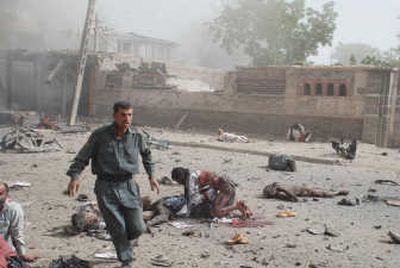Afghanistan bombing fans regional tensions

KABUL, Afghanistan – The car bomb that killed more than 40 people outside the Indian Embassy here Monday stoked regional tensions and threatened to erode already diminishing confidence in the government of Afghan President Hamid Karzai.
Afghanistan’s Interior Ministry indirectly blamed Pakistan for the suicide attack, the deadliest in Kabul since the fall of the Taliban movement in 2001. Nearly 150 people were injured in the bombing, an audacious strike in what previously had been considered a well-secured area of the Afghan capital.
Although Pakistan swiftly condemned the attack, it was likely to generate more acrimony between the neighbors, both considered key U.S. allies in the fight against Islamic militants. Afghan officials this spring accused Pakistan’s main intelligence service of having had a hand in an assassination attempt against Karzai in April. Last month, the Afghan leader threatened to send troops into Pakistan if authorities there could not stem the movement of insurgents across the border into his country.
Long-standing tensions between India and Pakistan have become entangled in the Afghan conflict. However, it was not immediately clear who carried out the bombing or why the Indian Embassy was targeted.
The bombing came amid surging violence in Afghanistan and as the writ of the Karzai government has been weakening. Many ordinary Afghans are disillusioned that daily life remains filled with hardship and fraught with danger six years after the U.S.-led invasion.
The bombing drew condemnation from the NATO-led International Security Assistance force, which is battling to subdue Taliban fighters in the country’s long-restive south and increasingly violent east. Data released last month by the U.S. military showed attacks in the east up 40 percent. In the south, the military deployed 2,300 additional Marines in March to help allied forces in the Taliban’s traditional homeland.
Fatalities among Western troops are running at their highest levels since the start of the war, with 127 killed this year, according to the independent Web site icasualties.org – on a pace to surpass last year’s toll of 232.
But attacks like Monday’s, even if aimed at official installations, tend to sweep away the most vulnerable.
Witnesses said the bomber tried to ram a pair of diplomatic vehicles entering the Indian Embassy just after 8:30 a.m. But passers-by on the thoroughfare in central Kabul, including women, infants and children, took the brunt of the powerful explosion, which reverberated across the city.
The force of the explosion blew out the embassy’s front gates, knocked down its perimeter wall and damaged buildings inside the compound. Nearly a dozen of the dead were thought to be Afghan men who had been waiting in a line outside the diplomatic mission, hoping to obtain Indian visas.